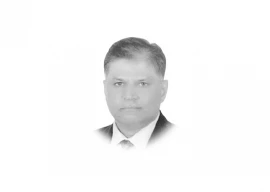
For Bangladesh, demanding justice for the war crimes of 1971 does not mean going backwards. Instead, it is about righting the wrongs that were committed in the past, in the search for a future. The unwavering demand of hundreds of thousands of youth at the Projonmo Chottor, demonstrates that the country’s history is sacred and dear to their identity. For the young generation of Bangladeshis, reconciliation with the events of 1971 can only be achieved through retributive justice for a pragmatic reason — only capital punishment can ensure justice because life imprisonment would mean giving the criminals a second life. The Bangladeshis know very well that as soon as the opposition party comes to power in the future, they may acquit the convicted criminals, who belong to their coalition party, the Jamaat-e-Islami (JI).
Certain quarters of society have raised the ethical question about the justification of capital punishment — an untimely debate held only to derail the movement of Projonmo Chottor. Furthermore, the international media has shown a dearth of interest in covering the protest, since the non-partisan movement is too peaceful and unpopular for a sensational media story. A Muslim-dominated country, demanding fair trial against a religious faction, is opposed to the image the media can sell well. And, of course, politicians of all camps are waiting to exploit the situation one way or another for their party’s gain.
Moreover, the International Crimes Tribunal of Bangladesh, established by the current ruling party, the Awami League, has encountered several logistical pitfalls and difficulties. Trying war criminals after an unfortunate span of 42 years is meant to be difficult and challenging, especially when many of the indictees were allowed to reign free for so long. Also, there are many war criminals who are not yet indicted and enjoy privileged positions in other political parties.
However, the message that the people clearly conveyed at the Square in Dhaka, is that they don’t want to see a politically-motivated trial, where criminals receive biased verdicts or the politicians put undue pressure on judges for hasty verdicts. The people have also made it clear that there is no place for the JI in Bangladeshi politics anymore, for the war crimes of some of their leaders are very well-documented. Citizens have rightfully called to boycott businesses, banks and services that are affiliated with the JI. For the first time in Bangladesh, the martyrs of 1971 are being respected under the aegis of the people’s conscience.
For Pakistan, it is an opportunity to mend ties rather than further widen the gap with Bangladesh. Allegations were made that Pakistan was initially interfering in Bangladesh’s tribunal process. Although Pakistan later clarified that it would not meddle in Bangladesh’s internal affairs, it never apologised for its involvement in the 1971 genocide. The war may have been one between India and Pakistan for the Pakistanis but it was a war of liberation for the Bangladeshis and carries great significance for them. The horrible stories of hundreds and thousands of deaths and rape cases during the ‘71 war will never be wiped out from the conscience of the Bangladeshis.
Pervez Hoodbhoy recently wrote in an article in this newspaper, “Shahbag Square — why we Pakistanis don’t know and don’t care”: (February 16) “The disinterest [of the Pakistanis] in Shahbag Square [the Projonmo Chottor] epitomises the enormous gulf that separates Bangladesh from Pakistan.” Therefore, the movement of Projonmo Chottor presents an opportunity for the young generation of Pakistanis to reach out to the young generation of Bangladeshis. It is an opportunity to revive a dialogue of reconciliation through the acknowledgement of the events and genocide of 1971, by sharing information and learning about each other’s perspectives.
Published in The Express Tribune, March 15th, 2013.
COMMENTS (8)
Comments are moderated and generally will be posted if they are on-topic and not abusive.
For more information, please see our Comments FAQ

1722852598-0/BeFunky-collage-(2)1722852598-0-165x106.webp)
1737595568-0/Untitled-design-(66)1737595568-0-165x106.webp)








1736070587-0/Express-Tribune-(2)1736070587-0-270x192.webp)
1737452260-0/Gaddafi-stadium-(2)1737452260-0-270x192.webp)
1737531830-0/Saim-Ayub-injury-(2)1737531830-0-270x192.webp)


1737462113-0/justin-(3)1737462113-0-270x192.webp)

@ Doyal Baba:
The so called Biharis are forgotten people because no body owns them and they do not have a political constituency. Some genocides are better forgotten for ploitical expediencies. Who would like to remember the role of Suharwardy in the great Calcutta masacare, or shed tears for the killing of Hindus in Noakhali. Even the Armenian genocide took more than two centuruies to be recognised as one. Bangladesh is not unique most of humanity is used such standards of justice.
Interesting piece, Asif. I think both sides need to come together and share perspectives. I hope folks saying things like "we're too busy" or "what about Biharis and pro-Pakistanis" are small in numbers and don't represent the younger/brighter tomorrow's rulers of Pakistan. Bangladesh is putting actions with their words. People are demanding justice. If Biharis demand justice, they need to come together as people, make allegations against specific folks, create a tribunal, etc. bangladeshis did not go to the Pakistani govt asking for justice, they are doing it on their own. To me, that's what differentiates who is being progressive.
Thanks for writing this.
What about the hundreds of thousands of Biharis and other pro-pakistani civilians that were murdered by the mukti bahini? who will reach out to them?
When the defeating, surrendering and occupation army continued to kill hundreds of intellectuals in Dhaka and dumped them in a big ditch, how can they now apologize or tried? The reason they committed those atrocities is they knew full well that they can get away with that. If they had any fear of prosecution they would not do that. They have no fear in Baluchistan either. Unless there is US investigation and war crimes tribunal nothing would happen. Pakistani govt and courts are impotent against the army. When was the last time any sitting general was tried for any crime including high treason?
@ALEX:
"Sorry Asif, Pakistanis are more worried about Afzal Gurus. They have no time!! The assembly is busy worrying about Afzal Gurus when hundreds of shias are killed."
Rightly said.
Pakistan's priorities are all completely backwards.
That's why Pakistan is a miserably failed state. And the funny thing is, nobody takes them seriously. Not even their close friend China.
@ Author. I agree with you that war criminals should be put on trial and given due punishment. However it should not be one sided. There were many in Mukhti Bhani involved in atrocities against urdu speaking West pakistanis, in thier murder and raping their women. The Bangladesh governmnet has not put forward any of those before any court. This makes this whole process quite partial and biased. It would have been better if people were tried irrespective of their political affiliations. The Bengladeshi people are right to ask for justice but it has been shown that when courts are uder pressure of masses and general sentiment in public, grave injustice can not be avoided. Just look at recent trial and execution of Kasmiri Afzal guru. The INidan supreme court argued that despite the lack of conclusive evidence, Capital Punishment was OK for Afzal guru because this is what the " public" wanted.
Sorry Asif, Pakistanis are more worried about Afzal Gurus. They have no time!! The assembly is busy worrying about Afzal Gurus when hundreds of shias are killed. You are way out of league man.
The best revenge BD can take from war crime is to eliminate JI.If BD fails to reckognise the real enemy, even thousand apologies from Pakistan will not help BD's struggle for prosperous and peacfull future.